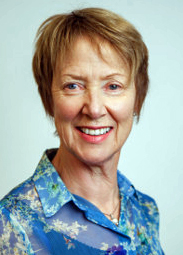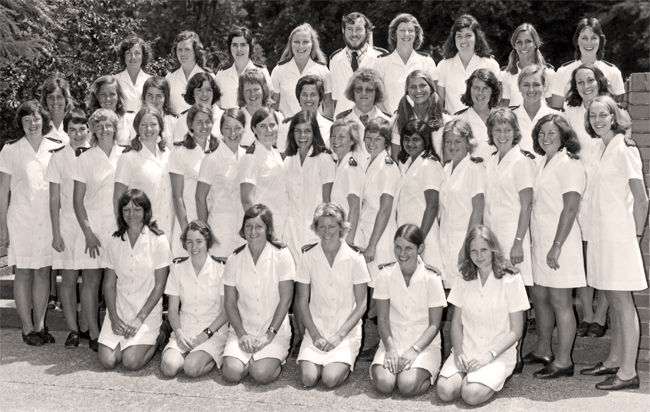The Sacred Heart Hospital in Dunedin, operated by the Little Sisters of the Poor has offered dignified eldercare since 1904.
The Order began in France in the winter of 1839 when Brittany native Jeanne Jugan found an elderly Anne Chauvin homeless and destitute and gave her safe refuge.
Otago educated physiotherapist, Lesley Inglis – Poppelwell tells us that her first 'real' job for the School was a position as a Clinical Educator with the Little Sisters of the Poor in Brockville, Dunedin.
Results over time
Back in 1990 with a young family to raise Lesley found juggling family life and work demanding, but she loved working with older 'Dunedinites' and it fitted her busy schedule.

Lesley Inglis (DipPhty) 2018
She noticed that the majority of patients in rest home care continued to live very independent lives. Many residents travelled widely, and continued to enjoy the companionship of families and communities. Some came 'home' only to eat and sleep.
Other patients found motivation difficult. For some, the term 'rest home' meant 'a place to rest', with no further effort required.
Lesley spotted tangible improvements in the physical and mental condition of her individual patients over time, and found this rewarding.
Nationwide measures in the late 1980s prompted moves towards supported living and this allowed many more capable individuals to stay in their own homes. The Little Sisters soon adapted to better address the needs of those with more chronic conditions or age-related issues.

Physiotherapy Class of 1972-1974.Back row: M. Kennedy, H. McQueen, G. Shirley, P. Monaghan, M. Wiklund, C. Humphries, S. Skellon, E. Haysom, A. Biss 2nd back row: J. Smith, J. Gollan, P. Bonifant, M. Duff, M. Sawers, L. Metherell, C. Walker, R. Taylor, J. Simmons, L. Vanderes, P. Dewes 2nd front row: H. Croy, A. Duncan, D. Johnson, N. Amyes, A. Ewen, G. Clements, R. Abbott, M. Drennan, S. Downey, J. Bagley, I. Cornelious, J. Stormont, L. Poppelwell, P. Brophy, N. Hubbard. Front row: M. Mullins, F. Mawson, V. Hamilton, C. Wilson, M. Pittaway, M. Ferris.
Always listening
As a Clinical Educator, Lesley's role spanned mentoring, hands-on teaching and clinical practice.
“Caring for the young and the elderly is not always uppermost in the minds of students looking for future careers in high-level sports physiotherapy or sports science but its vital that young physios learn to empathise with their patients. Good listening and interpersonal skills are so important”
Lesley believes that powerful and effective physiotherapy demands a holistic approach. When the clinician treats each patient as a unique human being, health outcomes demonstrably improve.
Change always constant
Until the late 1970's physiotherapists were only able to treat patients upon referral. Doctors prescribed courses of treatment and the physiotherapist followed instructions.
If the referral sanctioned heat therapy for muscular conditions (such as sprains), treatments with shortwave diathermy (high - frequency electromagnetic pulsing) were often applied.
In the belief that heat assisted the body's healing processes by increasing blood supply to cells and tissues, hot packs or heat coils were applied for 20 minutes before any massage treatment.
Neck and back conditions involved sustained spinal traction with weights, and almost all soft tissue injuries called for ultrasound treatment.
Groups of students undertook three sessions of three hours duration with Lesley demonstrating care techniques.
Lesley taught effective lifting by tasking students to kneel on the patient's bed and lift by the shoulders. Patients were cradled in a hug position for chair-to-chair transfer.
As a consequence, physiotherapists and nursing staff suffered neck and back problems. Some staff developed carpal tunnel syndrome yet, Lesley recalls, the introduction of 'no lift' policies and mechanical transfer aids faced considerable resistance from some practitioners.
Reality. Check.
Clinicians do not always have easy access to sophisticated tools nor skilled help. A physiotherapist in an isolated rural area must be capable and confident enough to treat a wide range of physical conditions, some of which go beyond the scope of formal training.
While there is growing international demand for physiotherapists in advisory and process-driven vocational training, there will always be a place for those dedicated to 'hands-on' manual therapy answering the needs of individual patients in our communities.
Trained, resourceful, and capable 'hands-on' clinicians carry out essential assessment, treatment and rehabilitation every day throughout New Zealand.
The immensely practical and dedicated work of Lesley Inglis and her peers continues to illuminate the teaching and practice of physiotherapy in New Zealand.
To Lesley go our thanks and appreciation.
